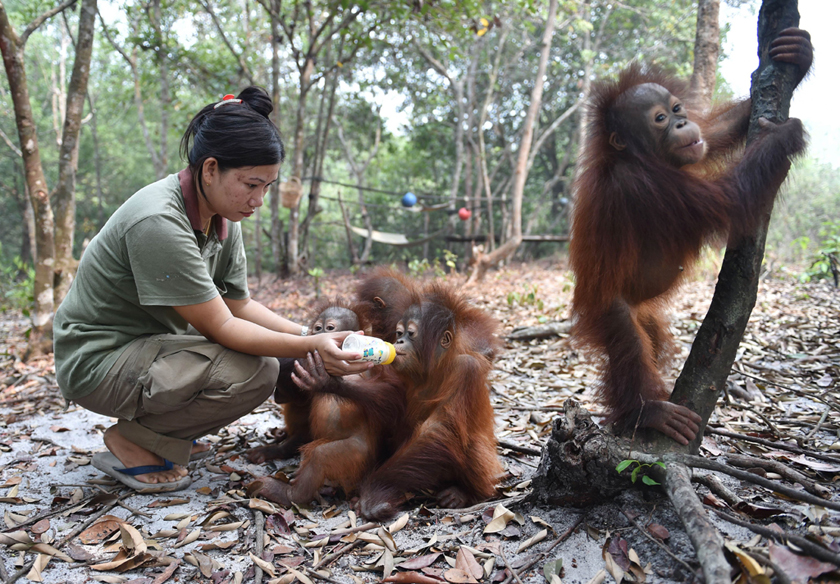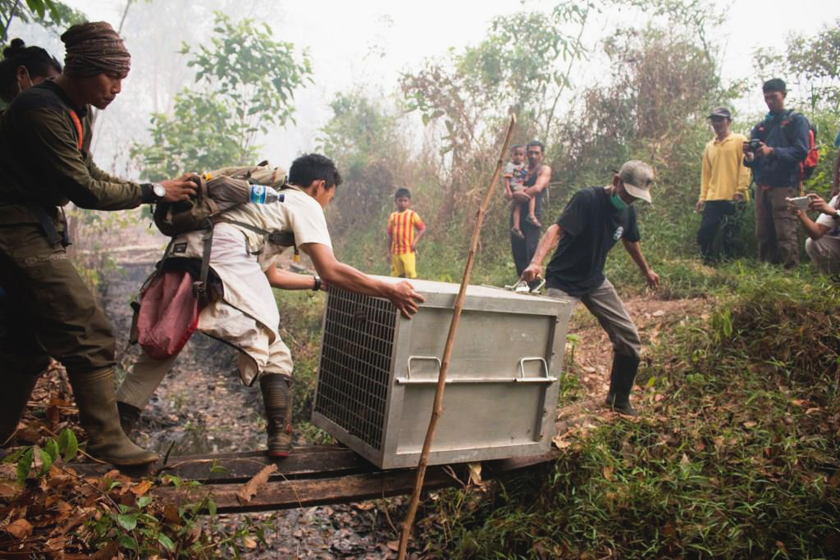Wild Fires Threaten Thousands Of Orangutans
Many of the fires have been deliberately set and the situation is now reaching a crisis point.
By Vicki Croke
Baby orangutans, who had been treated for respiratory problems, being fed by a worker at a nursery in the rehabilitation center operated by the Borneo Orangutan Survival Foundation in Central Kalimantan. Photo: Borneo Orangutan Survival Foundation (BOSF).
Thousands of endangered orangutans, at least a third of the world’s population, are in danger from out-of-control forest fires on Sumatra and Borneo. Many of the fires, deliberately set to clear land by palm oil companies among others, have been raging for months but the situation, according to conservationists, has now reached a crisis point.
“Forests full of orangutans” are on fire, according to a statement from Karmele Llano Sanchez of International Animal Rescue (IAR). The group is rescuing animals who are burned out of their homes and are sick and dehydrated from fire and smoke.
Greenpeace drone footage gives a disturbing glimpse of conditions on the ground in Indonesia. Video: GreenpeaceVideo/YouTube.
It’s impossible to know how many orangutans have died, but the scope of the disaster, according to an article by Esther Castillejo of ABC News, is massive:
About 40,000 orangutans remain in Borneo, plus 10,000 more on the island of Sumatra in Indonesia. Dense smoke, burning fire and lack of food have not only caused malnourishment, burns and respiratory diseases, but it has also pushed the mammals closer to human settlements, where they face the danger of being killed or caged by locals.
Richard Zimmerman, executive director of Orangutan Outreach, a conservation group that is funding a firefighter program for people in the region, said the consequences of the fires are staggering.
“There are the homes of the biggest remaining populations of orangutans,” Zimmerman told ABC News. “The estimate is about 3,000 orangutans are lost each year; every loss is critical.”
IAR reports that “the fires have spread to protected areas such as national parks and conservation areas.” Many conservation groups have blamed much of the deforestation on palm oil development. And IAR says, “Unprotected habitats have been under huge pressure, putting orangutans at serious risk, but now that protected areas are also threatened there is no longer any safe refuge for orangutans.”
People from International Animal Rescue are working hard to save orangutans caught up in the forest fires. Photo: International Animal Rescue.
This is a catastrophic escalation of the problem. As The South China Morning Post reports:
Satellite photography shows that around 100,000 fires have burned in Indonesia’s carbon-rich peatlands since July. But instead of being mostly confined to farmland and plantations, as they are in most years, several thousand fires have now penetrated deep into primary forests and national parks, the strongholds of the remaining wild apes and other endangered animals.
Alarmingly, 358 fire “hotspots” have been detected inside the Sabangau Forest in Borneo which has the world’s largest population of nearly 7,000 wild orangutans. Elsewhere, fires are raging in the Tanjung Puting national park, home to 6,000 wild apes, the Katingan forest with 3,000 and the Mawas reserve where there are an estimated 3,500.
In one area, Pematang Gadung where IAR runs a conservation project, the group reports that fires are being fought by local patrol teams “using portable pumps and water sprayers.” And even the animals held at IAR’s sanctuary are at risk because of smoke inhalation.
Groups like Orangutan Outreach are helping to save orphaned orangutans. Photo: Orangutan Outreach.
Two factors are adding to the disaster: El Niño weather conditions making the area dry and windy right now, and the burning of peat forests, which are filled with material that when dry catches fire easily and is hard to extinguish.
According to an article by John R. Platt in Takepart, the fallout from this environmental disaster is global:
The fires threaten more than just Indonesia’s wildlife: They have also created a cloud of smoke and haze big enough to be seen from space and are releasing an estimated 15 to 20 million tons of carbon dioxide per day—more than the emissions from the entire U.S. economy. “This isn’t just one little fire in one little area,” Zimmerman said. “It’s the whole earth.”
Nature may finally be providing relief this week. According to a New York Times reporter in Jakarta, “long-awaited heavy rains” have begun to fall.




2 Responses to “Wild Fires Threaten Thousands Of Orangutans”
Is there anything we can do to help? To what organization should we contribute?? This is so sad and maddening!
Borneo Orangutan Survival Foundation, International Animal Rescue and Orangutan Outreach all have great websites where you can learn more about how to help. :-)
Comments are closed.